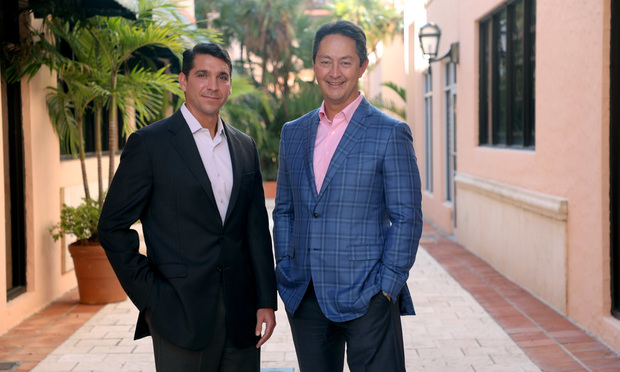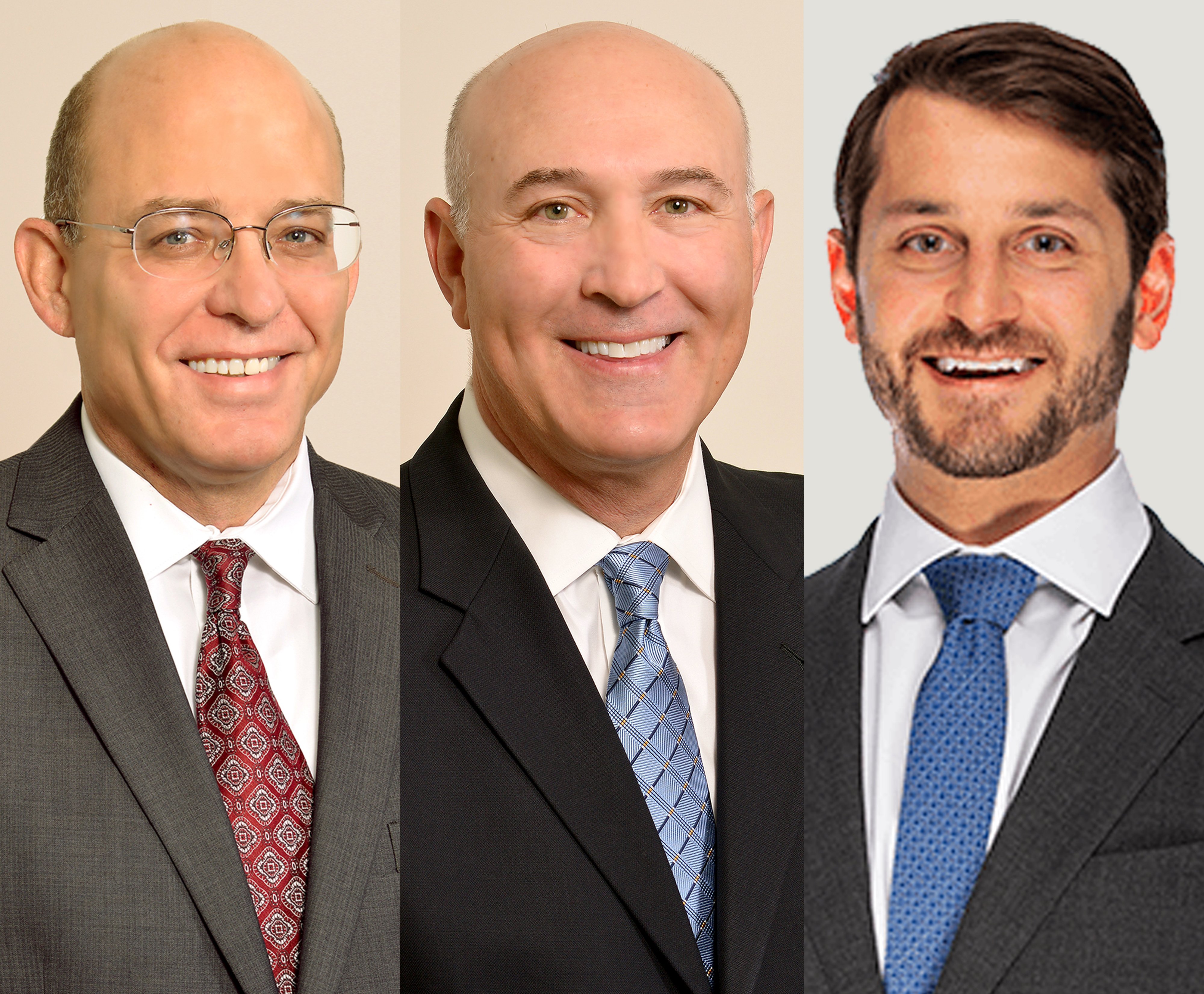South Florida Attorneys Win $8M Bad Faith Verdict in Quadriplegia Case
The jury found an auto insurer acted in bad faith by not removing a potential lienholder from a settlement check for a man paralyzed in a crash.
February 12, 2018 at 02:18 PM
5 minute read

South Florida attorneys won an $8 million bad faith verdict against an insurance company that allegedly failed to properly handle a settlement check for a young man rendered quadriplegic in a 2011 car crash.
The Jan. 26 verdict in favor of Palm Beach Gardens firm Domnick Cunningham & Whalen hinged on questions about how insurers should address settlements of personal injury claims when medical liens are involved.
Jacksonville resident Kevin Whitney, then 23, was riding in the backseat of a car with friends when passenger Aaron Ensley jerked the steering wheel and caused a crash, according to the lawsuit. Whitney was paralyzed less than a year after becoming a father.
Ensley's insurer, Mercury Insurance Company of Florida, tendered the limits of his policy — $10,000 — to Whitney less than a month after the December 2011 crash. The check was made out to the man and his attorneys.
But when Whitney discharged his law firm several months later, things began to get complicated.
The man's mother, Amy Whitney, received the case file, signed the release and sent it to Mercury. She asked the company if she could cash the check, according to Whitney's attorneys in the bad faith case, Fred Cunningham and Gregory Yaffa of Domnick Cunningham & Whalen in Palm Beach Gardens.
Mercury re-issued the check, but this time made it out to Whitney and Shands Teaching Hospital and Clinics Inc. in Gainesville, where the man received care after the crash. The insurance company argued at trial it's industry practice to include a lien holder on a settlement check if no attorney is involved.
“Obviously, we disagreed with that,” Cunningham said.
At that point, the Whitneys could not cash the check without an endorsement from Shands. Amy Whitney wrote to Mercury to ask them to remove the hospital's name from the check. She said she called Shands and was told she had a zero balance because Medicaid was paying for her son's hospital stay. (Shands has no record of the call.)
“That letter was responded to by Mercury to say, 'Sure, we can take Shands off the check, but if Medicaid paid, we may have to protect the lien,'” said Mercury attorney Kathy Maus of Butler Weihmuller Katz Craig in Tallahassee.
The plaintiffs attorneys said Amy Whitney does not remember receiving that voicemail and Mercury did not follow up, so the Whitneys decided to return the check and file litigation against Ensley. The personal injury lawsuit never made it to trial, resolving with an $8 million consent judgment in 2015.
Domnick Cunningham & Whalen then filed a bad faith claim against Mercury in February 2016, alleging Mercury did not do enough to protect Ensley from the exposure. Because Ensley didn't want to be involved, the firm took the “very unusual” step of bringing the claim on Whitney's behalf, Cunningham said.
At trial in Jacksonville before Duval Circuit Judge Adrian Soud, the defense argued Mercury believed any claims against Ensley were settled. Maus and her colleague Julius “Rick” Parker also told the jury Amy Whitney's letter asking for Shands' removal from the check was a question, not a demand.
Kevin Whitney “never made a demand to change anything, and in fact signed a release and sent it back to Mercury, so Mercury therefore at all times thought the case was settled,” Maus said.
Whitney's attorneys argued Mercury did not act reasonably in protecting Ensley from the multimillion-dollar quadriplegia claim. Mercury and Shands had just gone before the Florida Supreme Court in another case, receiving a 2012 decision saying a hospital asserting an insurance company impaired a lien may only recover the policy limits.
Thus, even though the Whitney lien was about $220,000, Mercury knew it would only be on the hook for $10,000 at most if it impaired the lien by leaving a lienholder off the check, Cunningham argued.
“They knew that Aaron Ensley had nothing, and so they were understandably concerned that the hospital or Medicaid could come after Mercury … [But the company] should have been focused on protecting him from Kevin Whitney's claim, which was the greatest exposure by far,” Cunningham said.
The jury found Mercury acted in bad faith, which put the company on the hook for the $8 million judgment against Ensley.
Mercury filed a motion for new trial on Friday, challenging the jury instructions and some of the evidence.
The main evidentiary dispute revolves around the fact that Geico, which insured the driver of the car, paid Whitney the policy limits without putting any lienholders on the check.
The judge ruled plaintiffs counsel could not make arguments about Mercury's alleged bad faith based on Geico's actions. Instead, Geico could only be mentioned to give jurors an idea of Amy Whitney's mindset when she contacted Mercury about taking Shands off the check.
Maus said a plaintiffs witness told the jury “Geico did it right,” which she argues “poisoned the jury.” A mistrial motion at the time was denied.
“We believe very strongly that [the verdict] will be reversed or a new trial will be granted,” Maus said.
Case: Kevin Whitney vs. Mercury Insurance Company of Florida
Case No.: 16-2016-CA-000925-XXXX-MA
Description: Bad faith
Filing date: Feb. 11, 2016
Verdict date: Jan. 26, 2018
Judge: Duval Circuit Judge Adrian Soud
Plaintiffs attorneys: Fred Cunningham and Gregory Yaffa, Domnick Cunningham & Whalen, Palm Beach Gardens
Defense attorneys: Kathy Maus and Julius “Rick” Parker, Butler Weihmuller Katz Craig, Tallahassee
Verdict amount: $8 million
This content has been archived. It is available through our partners, LexisNexis® and Bloomberg Law.
To view this content, please continue to their sites.
Not a Lexis Subscriber?
Subscribe Now
Not a Bloomberg Law Subscriber?
Subscribe Now
NOT FOR REPRINT
© 2025 ALM Global, LLC, All Rights Reserved. Request academic re-use from www.copyright.com. All other uses, submit a request to [email protected]. For more information visit Asset & Logo Licensing.
You Might Like
View All
Million-Dollar Verdict: Miami Jury Sides With Small Business

Automaker Pleads Guilty and Agrees to $1.6 Billion in Payouts

'I've Seen Terrible Things': Lawyer Predicts Spike in Hazing Suits
Trending Stories
- 1States Accuse Trump of Thwarting Court's Funding Restoration Order
- 2Microsoft Becomes Latest Tech Company to Face Claims of Stealing Marketing Commissions From Influencers
- 3Coral Gables Attorney Busted for Stalking Lawyer
- 4Trump's DOJ Delays Releasing Jan. 6 FBI Agents List Under Consent Order
- 5Securities Report Says That 2024 Settlements Passed a Total of $5.2B
Who Got The Work
J. Brugh Lower of Gibbons has entered an appearance for industrial equipment supplier Devco Corporation in a pending trademark infringement lawsuit. The suit, accusing the defendant of selling knock-off Graco products, was filed Dec. 18 in New Jersey District Court by Rivkin Radler on behalf of Graco Inc. and Graco Minnesota. The case, assigned to U.S. District Judge Zahid N. Quraishi, is 3:24-cv-11294, Graco Inc. et al v. Devco Corporation.
Who Got The Work
Rebecca Maller-Stein and Kent A. Yalowitz of Arnold & Porter Kaye Scholer have entered their appearances for Hanaco Venture Capital and its executives, Lior Prosor and David Frankel, in a pending securities lawsuit. The action, filed on Dec. 24 in New York Southern District Court by Zell, Aron & Co. on behalf of Goldeneye Advisors, accuses the defendants of negligently and fraudulently managing the plaintiff's $1 million investment. The case, assigned to U.S. District Judge Vernon S. Broderick, is 1:24-cv-09918, Goldeneye Advisors, LLC v. Hanaco Venture Capital, Ltd. et al.
Who Got The Work
Attorneys from A&O Shearman has stepped in as defense counsel for Toronto-Dominion Bank and other defendants in a pending securities class action. The suit, filed Dec. 11 in New York Southern District Court by Bleichmar Fonti & Auld, accuses the defendants of concealing the bank's 'pervasive' deficiencies in regards to its compliance with the Bank Secrecy Act and the quality of its anti-money laundering controls. The case, assigned to U.S. District Judge Arun Subramanian, is 1:24-cv-09445, Gonzalez v. The Toronto-Dominion Bank et al.
Who Got The Work
Crown Castle International, a Pennsylvania company providing shared communications infrastructure, has turned to Luke D. Wolf of Gordon Rees Scully Mansukhani to fend off a pending breach-of-contract lawsuit. The court action, filed Nov. 25 in Michigan Eastern District Court by Hooper Hathaway PC on behalf of The Town Residences LLC, accuses Crown Castle of failing to transfer approximately $30,000 in utility payments from T-Mobile in breach of a roof-top lease and assignment agreement. The case, assigned to U.S. District Judge Susan K. Declercq, is 2:24-cv-13131, The Town Residences LLC v. T-Mobile US, Inc. et al.
Who Got The Work
Wilfred P. Coronato and Daniel M. Schwartz of McCarter & English have stepped in as defense counsel to Electrolux Home Products Inc. in a pending product liability lawsuit. The court action, filed Nov. 26 in New York Eastern District Court by Poulos Lopiccolo PC and Nagel Rice LLP on behalf of David Stern, alleges that the defendant's refrigerators’ drawers and shelving repeatedly break and fall apart within months after purchase. The case, assigned to U.S. District Judge Joan M. Azrack, is 2:24-cv-08204, Stern v. Electrolux Home Products, Inc.
Featured Firms
Law Offices of Gary Martin Hays & Associates, P.C.
(470) 294-1674
Law Offices of Mark E. Salomone
(857) 444-6468
Smith & Hassler
(713) 739-1250







